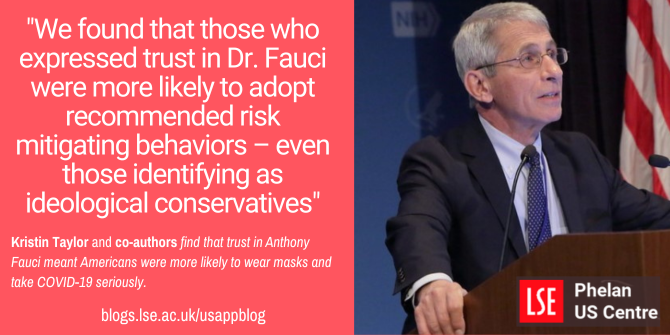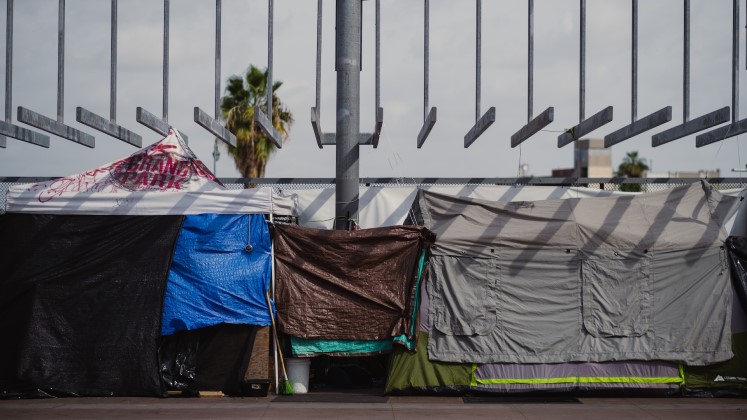During the early stages of COVID-19, US states were largely in charge of public health responses, resulting in a fragmented policies and implementation efforts across the country. In new research, Kristin Taylor, Rob A. DeLeo, Elizabeth Albright, Elizabeth A. Koebele, Thomas A. Birkland, Elizabeth Shanahan, Deserai Anderson Crow, and Meng Li examine the role of the National Institute of Allergy and Infectious Disease Director and Chief Medical Advisor, Dr. Anthony Fauci, in advising Americans about the risks of COVID-19 and measures to mitigate them. They find that those who expressed trust in Dr. Fauci had heightened perception of the risk of COVID-19 and increased mask usage, a phenomenon even more prominent among conservatives.
While many governments now consider the COVID-19 pandemic as something that is now in our near-past, its effects continue to linger throughout all aspects of society. During this critical period, scholars and practitioners alike have begun to take stock of how effectively governments responded to the pandemic through their policy decisions. Were government actions largely successful at reducing deaths and illness to the extent that was possible? Or were they overly severe in their responses, leading to unnecessary isolation, job losses, and an economic downturn?
Dr. Anthony Fauci and the COVID-19 pandemic
In the United States, much of this assessment has centered on the actions of Dr. Anthony Fauci, who was at the forefront of the U.S. Government’s response to the COVID-19 pandemic. Dr. Fauci was the director of the National Institute of Allergy and Infectious Disease in the National Institutes of Health from 1984 to 2022 and the Chief Medical Advisor to the president from 2019 to 2022. As a doctor, scientist, and advocate, Dr. Fauci was both a highly trusted source of advice for some communities and a highly polarizing figure in others.
Our new research examines Dr. Fauci’s influence on the public’s uptake of risk reduction measures during the pandemic to understand his effectiveness in helping to mitigate the impacts of COVID-19 on multiple sectors of society. We found that those who expressed trust in Dr. Fauci were more likely to adopt recommended risk mitigating behaviors – even those identifying as ideological conservatives. These findings highlight the critical role of trust in fostering broad compliance with public health recommendations and requirements.
Dr. Fauci has a long history of being entrepreneurial in advocating for public health policies, beginning with the HIV/AIDS crisis in the 1980s. We expected him to be equally entrepreneurial during the COVID-19 pandemic, advocating for policies that would slow the spread of the virus. What made Dr. Fauci’s role in the COVID-19 pandemic different from his roles in previous public health crises, however, is that his entrepreneurship was focused on persuading the American public to take protective measures to slow the spread of the COVID-19 virus, rather than advocating for policy change at the government level.
Measuring Dr. Fauci’s influence
To measure Dr. Fauci’s influence, we conducted a three-wave internet survey of respondents residing in six states: Colorado, Iowa, Louisiana, Massachusetts, Michigan, and Washington. The states were selected in April 2020, during an acute phase of the crisis when 25 states had implemented stay-at-home orders (with set expiration dates) and other risk mitigating measures, like social distancing and mask wearing requirements or recommendations. The survey relied on a panel design – or repeated measurements of the same person’s perspectives and actions over time – to measure changes in risk perception and risk mitigating behavior from the initial period of the pandemic in May 2020 to October 2020, when many restrictions were eased, and the rate of infections dropped in many places.

“Anthony S. Fauci, M.D., NIAID Director” (CC BY 2.0) by NIAID
Americans – conservatives included – listened to Dr. Fauci
Our findings indicate that Dr. Fauci was particularly influential for heightening an individual’s perceived risk of contracting the virus, as well as for encouraging individual uptake of COVID-19 risk mitigation behaviors, particularly mask wearing. Among those surveyed, Dr. Fauci’s influence on risk perception and masking was particularly strong among ideological conservatives. This is notable – and somewhat surprising – because we expected Dr. Fauci to be highly influential among liberals and moderates but not necessarily among conservatives who may have been polarized by his suggestions. Indeed, for individuals with a more liberal ideology, Dr. Fauci was already “preaching to the choir,” meaning that there was less room for him to persuade them to take actions they otherwise wouldn’t have taken. However, for conservatives, Dr. Fauci’s influence led to a greater likelihood of masking and a heightened perceived risk of getting COVID-19. This suggests that Dr. Fauci was likely more influential to those who were not liberal than was previously understood.
Dr. Fauci’s influence during the early days of the pandemic did not occur in a vacuum, however. His influence over individuals to take up self-protecting behaviors was moderated by a host of factors, including the worldview of the individual, a person’s perception of the political context in which the pandemic occurred, and their media consumption. This suggests that any advice Anthony Dr. Fauci might have offered to the American people from the podium in daily briefings, op-eds, and cable news appearances was filtered through the broader political and social environment from March to December of 2020. This is unsurprising, given the highly polarized politics and fragmented response from federal and state governments to COVID-19.
However, Dr. Fauci’s message to the public to take seriously the risks of COVID-19 and to wear a mask cut through a lot of the political “noise” in the early days of the pandemic, despite variations in individual perspectives and experiences. Regardless of these factors, if individuals trusted Dr. Fauci, they had a higher risk perception and wore masks.
Dr. Fauci’s waning influence
Finally, we found that Dr. Fauci’s ability to act as a policy entrepreneur and influence individuals to engage in risk-reducing behavior waned over time. The early period of the pandemic was rife with uncertainty about the virus and how it was transmitted, creating a window of opportunity for Dr. Fauci to persuade the public to take the risk of getting the virus seriously and, later, to wear a mask. However, as the pandemic lingered, many other voices entered the discussion about COVID-19 responses – whether arguing for aggressive measures to slow the spread of COVID-19 or for the rollback of existing measures to balance COVID-19 risks with the need for normal economic and social life to return. Overall, though, Dr. Fauci was an outstanding example of a policy entrepreneur that invested his scientific reputation and his decades of experience in making recommendations that, while not always popular, helped reduce the spread of COVID-19.
- This article is based on the paper, ‘Policy entrepreneurs and individuals: Influence and behavior in pandemic response’, in Public Administration Review.
- Please read our comments policy before commenting.
- Note: This article gives the views of the author, and not the position of USAPP – American Politics and Policy, nor the London School of Economics.
- Shortened URL for this post: https://bit.ly/43k8mWW






